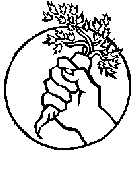
| Contents | Start | Previous | Next |
The crowd had swelled to several hundred and filled one corner of Golden Gate Park. Food Not Bombs volunteers spread out long blue tarps on the ground and set out food; but when dozens of people started serving the crowd, riot police clutching their nightsticks, with the plastic visors of their helmets pulled down, moved into the park. At one point, a cop began to pound a server with his club. A Channel 5 camera operator was filming this when the supervising police lieutenant calmly walked up behind him and knocked him to the ground, cutting the operator's face on the camera. The police tried to cordon off areas by marching around the field, but the food-serving kept moving. It became impossible for the police to take control of any ground, and soon the protesters were marching behind the lines of riot police, dancing and chanting in a parody of the attempt to control them. One line of protesters wove into a circle and everyone held hands and sang "Give Peace a Chance." Fifty-four servers were ultimately arrested, but little did we know this was not going to be the end of wholesale police attacks against the San Francisco Food Not Bombs.
We never would have guessed that the mayor would want to meet with us to negotiate an end to this situation, but the arrests were rapidly becoming a political embarrassment. City officials obviously had made a big mistake when they ordered the arrest of Food Not Bombs. Support was coming in from around the country, and growing. People were outraged. It was almost unimaginable that anyone in this country could be arrested for feeding the poor in a city park. The mayor, the chief of police, the city attorney, other city officials representatives from the ACLU, and community activists met together to negotiate. Food Not Bombs' correspondence with the city showed that the police were using the Parks Department to create a problem that did not exist. There were no permits needed for this kind of activity and the city looked stupid. We decided at this meeting to meet again the next day; we also agreed not to talk to the press and that there would be no more arrests until we reached a settlement.

On the way to the second meeting, however, a Food Not Bombs negotiator
was arrested for hugging a homeless Vietnam vet who was, at that moment,
planning to jump off the Golden Gate Bridge because he was sick of living
in the park. After 45 minutes, the police released him, and he was
able to attend the meeting only because it started late. The Food Not Bombs
representatives decided they were not willing to continue the negotiations
because the city had proved itself untrustworthy by arresting a negotiator
on his way to the meeting and by releasing a press statement the night
before that was derogatory to Food Not Bombs. We told the mayor we would
continue serving free food in the park and we would leave it up to him
to decide whether to order more arrests.
| Contents | Start | Previous | Next |